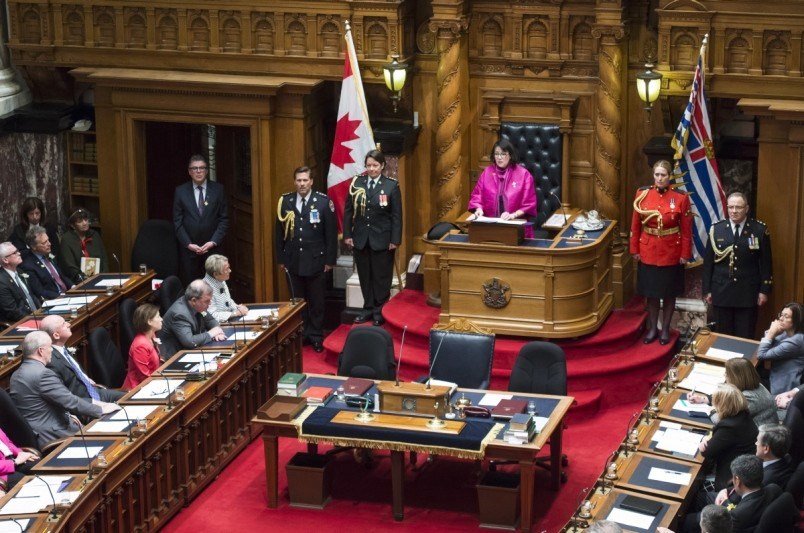Centred around the theme of making life more affordable, the NDP government's throne speech promises to unveil a poverty-reduction strategy, enshrine universal daycare into law, continue a freeze on ferry fares and prevent British Columbians from being gouged by ticket scalpers, predatory payday lenders and high cellphone bills.
"Government is making different choices to make life better, so that B.C.'s bright future and unlimited potential is shared with everyone, not just the few," said the speech, delivered by Lt.-Gov. Janet Austin Tuesday at the B.C. legislature.
While there was no mention of the NDP's campaign pledge for $10-a-day child care, the government said universal daycare will build on child-care subsidies introduced in last year's budget, measures that lowered daycare fees.
"This year, government will set the foundation for the full implementation of B.C.'s affordable child-care program," the speech said. "A key element of this effort will be a collaborative process to develop new legislation to give universal access to quality, affordable child care the force of law."
In November, thousands of parents were told they would pay $10 a day for daycare until March 2020 if their children were enrolled at 53 prototype daycares. More details on child care could be released in next Tuesday's budget.
The throne speech highlighted initiatives already implemented by the B.C. government, including elimination of medical services plan premiums as of Jan. 1, 2020, investments in affordable housing and reforms to protect renters, and maintaining a freeze on ferry fares for major routes and discounts on minor routes.
The speech acknowledged that public trust has been shaken because of the spending scandal that has rocked the B.C. legislature. The legislature's two most senior officials, clerk Craig James and sergeant-at-arms Gary Lenz, have insisted they are innocent in the face of the Speaker's allegations of overspending and questionable expenses.
The two are suspended with pay while an investigation is conducted by police.
"The strength of this legislature does not come from stone, slate marble or granite. It comes from a foundation of public trust," the throne speech said.
"That trust was recently shaken. This government values transparency and takes very seriously its responsibility to maintain the integrity of our public institutions."
The government said it will work with the legislative assembly to implement reforms that restore trust in the legislature.
A poverty-reduction strategy will help the more than half a million British Columbians who live below the poverty line, the speech said. Premier John Horgan told reporters after the throne speech that more specifics will be in the budget.
Cellphone providers got special mention, with the government promising to look into ways to make cellphone bills more transparent and help consumers pay less. Horgan acknowledged that the province will have to work with the federal government, which has jurisdiction over telecommunications.
"For us it's a consumer protection issue," Horgan said. "We want to make sure that cellphone providers here in British Columbia are open and transparent about the packages they're putting forward."
The government promised to crack down on predatory payday lenders and ban the scalper bots that inflate ticket prices for concerts and sporting events.
Liberal Leader Andrew Wilkinson said the throne speech indicated the government has "spent a lot of money and accomplished very little ... with no plan for improving the economy whatsoever."
"There was nothing of any substance in this throne speech about how to make life better for British Columbians except a few token things such as cellphone bills, which is purely federal jurisdiction, and to reduce the cost of concert tickets," he said.
The throne speech addressed the money-losing public car-insurance corporation, saying changes that take effect April 1 could turn the tide for Insurance Corp. of B.C. and stem further rate increases. The reforms are the "most significant" changes to car insurance in a generation, the speech said, including "new laws, new systems and a new independent tribunal to resolve insurance disputes."
In addressing the housing crisis, the government pointed to the 17,000 homes being built with government grants, including on-campus homes for students, Indigenous housing on and off reserves, housing for women and children fleeing domestic violence, and affordable
rentals for families.
The speech addressed the tent cities that have popped up around the province, including in Nanaimo, saying hundreds of people previously living in tents are now in modular homes.
The government insisted its efforts to cool the housing market, through the speculation tax and the foreign buyers tax, are working, pointing to a moderated real estate market in Metro Vancouver.
The speech also said more funding is on the way to modernize the Royal B.C. Museum and plans are in place for a new Chinese Canadian Museum.
B.C. residents have a right to be outraged by the possibility that the province's high house prices are fuelled by criminal activity and money laundering, the government said, promising to close loopholes and find ways to prevent criminals from gaming the system. However, there was no mention of a public inquiry, which Horgan later told reporters is expensive, lengthy and might not yield solutions.
The throne speech touted the government's Clean B.C. climate actions, which encourage drivers to opt for clean-energy vehicles and the oil and gas industry to move toward renewable energy.
Green Party Leader Andrew Weaver said it was ironic that the mention of Clean B.C., a program that is essential to the power sharing agreement between the minority NDP government and the Greens, was followed by a nod to B.C.'s liquefied natural gas industry.
Weaver said the Greens will not support any legislation on LNG.
The throne speech "seemed like a bit of a laundry list of rather populist issues," Weaver said, adding that it lacked "a vision for a prosperous future grounded in innovation, grounded in an economic agenda."




